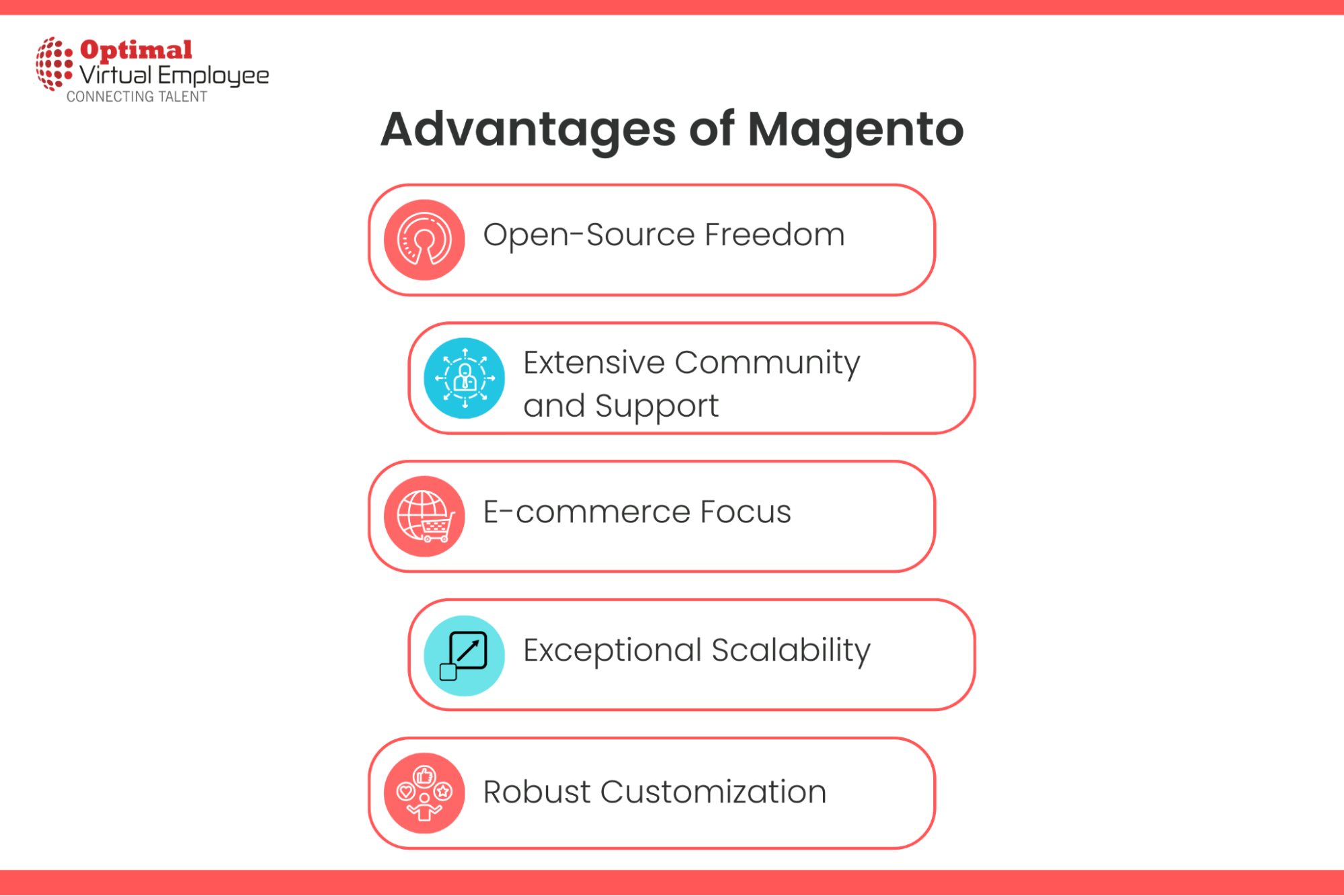To begin an online business, the first step is selecting an eCommerce platform. While there are numerous eCommerce platforms available, Magento stands out as the top choice. Magento eCommerce is a versatile and customizable platform that aids businesses in building online stores. Magento provides three distinct versions tailored to suit businesses of all sizes, ranging from startups to large corporations. Additionally, Magento’s architecture is user-friendly and empowers you to have control over your store’s design and functionality. If you’re searching for an eCommerce platform to facilitate the launch of your online business, Magento is certainly an excellent option to explore.
What Is Magento?
Magento is an online eCommerce platform, owned by Adobe, designed to create a versatile experience for both B2B and B2C customers. What distinguishes Magento from other platforms is its robust product management capabilities, allowing businesses to effortlessly expand their product catalogs to over one million items as they grow.
Being a feature-rich platform, it streamlines eCommerce operations and equips sellers with readily available tools for marketing, search engine optimization (SEO), and product management, among other functionalities.
Why Is Magento So Popular?
Magento enjoys its popularity in the eCommerce realm for several reasons: it offers a user-friendly interface, seamless integration with third-party applications, responsive web design, a wide range of deployment options, and a straightforward purchasing experience for customers.
What’s the Magento History?
The Magento e-commerce platform was initially developed using the Zend Framework and was introduced by Varien in March 2007. It was originally released under the name ‘Bento’ in March 2008. Over time, it garnered several accolades, including the “Best of Open Source Software Awards” and the “SourceForge Community Choice Awards.”
In subsequent years, Magento saw the release of various editions. In June 2008, the community edition made its debut, followed by the enterprise edition in April 2009, and the mobile edition in May 2010. In 2011, eBay acquired a 49% stake in the company, which was later acquired by Permira. After its acquisition by Adobe in 2018, Magento solidified its presence in the enterprise market.
Formerly known as Magento Community, Magento Open Source is the version of Magento that can be downloaded, customized, and self-hosted by anyone. Users also have access to numerous themes and extensions, making it a popular choice among small and medium-sized businesses.
Prior to Magento Enterprise Cloud, there were two versions of Magento Enterprise. However, in recent years, the software has been consolidated into a single version known as Magento Commerce. This premium version offers an expanded set of features and higher levels of support.
Magento 2 addresses the shortcomings identified by developers in its latest update. Magento 2 boasts improved speed (50% faster loading), enhanced security, greater efficiency, and increased scalability compared to Magento 1. It delivers enhanced security, a more engaging customer experience, and flexible website design options.
For Magento 2 licenses, pricing starts at $24,000 annually, providing access to additional features, rewards programs, targeted promotions, and round-the-clock customer support. Furthermore, businesses have the flexibility to deploy the solution either on-premises or in the cloud.
Why use Magento?
Selecting the right e-commerce platform poses a significant challenge for business owners embarking on the journey of creating an online store. With a multitude of solutions available, each with its own unique characteristics, pinpointing the ideal choice can be quite daunting. However, taking the initial step in this direction is a positive move. Let’s delve into some key advantages and features of Magento.
Open-Source Freedom:
When you inquire about the reasons people opt for Magento, the most common response is its status as a free and open-source platform. This attribute is frequently highlighted as one of Magento’s primary benefits. The Magento Community Edition, a freely available software, is accessible to all.
Installation of the product doesn’t demand a technical background and is a relatively swift and straightforward process. You can even construct a rudimentary store without any prior coding experience or technical expertise. In the long run, this translates to significant cost savings.
However, there exists an opposing perspective. Since the code can be modified by anyone and additional features can be incorporated, which may be essential for a specific online store, fully harnessing Magento’s capabilities, working with Magento extensions, and implementing new features necessitate a profound understanding of technical aspects and proficiency in PHP.
Extensive Community and Support:
The platform’s broad appeal is heightened by its diverse community of developers. They are always encouraged to seek assistance and offer help within the Magento Community. Dedicated forums cover a wide array of topics, ensuring that programmers can find solutions to virtually any query. Among the many reasons to opt for Magento, the extensive community stands out as one of the most compelling aspects. Additionally, hiring Magento developers is a hassle-free endeavor.
E-commerce Focus:
Magento was purpose-built with the specific needs of e-commerce in mind, aiming to address the full spectrum of challenges and tasks that online store owners might encounter.
The platform is meticulously crafted to optimize operations in every aspect. With a wealth of plugins, extensions, and support for various payment gateways, languages, and currencies, it encompasses everything a store owner could require. This comprehensive approach further solidifies Magento as an excellent choice for e-commerce ventures.
Exceptional Scalability:
Magento’s scalability stands as one of its most formidable attributes. The platform adeptly manages all your tasks and accommodates rapid business growth. Whether you start as a small online retailer or a burgeoning enterprise, Magento offers the flexibility to upgrade to its Enterprise version as your business expands. To enhance functionality, you can easily incorporate ready-to-install extensions or enlist the expertise of seasoned Magento 2 eCommerce developers who can efficiently scale your online store.
Unparalleled Performance:
Irrespective of your store’s size, Magento leads the way in terms of performance. It delivers high-performance websites while consuming minimal server resources, a pivotal feature that sets it apart.
Multi-Store Capabilities:
Magento offers two compelling benefits that make it the ideal choice for your business. With a single admin dashboard, you gain the ability to oversee products, billing, and customer data for multiple online stores. Using Magento, you can establish multiple stores that share the same backend.
The advantages of multi-store support extend into the long term, saving businesses both time and money. Moreover, you have the flexibility to configure the store in any language you prefer, either for the entire store or specific elements. These stores can also be configured to support multiple languages, further enhancing their versatility.
Robust Customization:
Magento distinguishes itself from Shopify and other eCommerce platforms due to its extensive customization capabilities. While competitors offer a range of themes that often appear similar, Magento empowers your eCommerce business to craft a distinctive storefront that sets you apart from the competition. This high degree of customization is a compelling reason to choose Magento over alternative solutions.
Effortless Integrations:
Magento caters to business owners aiming for growth. Seamlessly integrating with third-party services makes adding new functionalities or enhancing existing ones a straightforward process. Magento stores can seamlessly integrate with various services, including payment options, shipping, tracking, transportation services, Google Analytics, and Google Shopping.
SEO Optimization:
Magento is renowned for its SEO-friendly features, even though some eCommerce businesses may not fully grasp the significance of SEO. With Magento, your online store gains higher search engine rankings thanks to built-in SEO-friendly features. You can easily incorporate elements such as URLs, tags, descriptions, and sitemaps into your website, underlining the value of Magento as a tool for SEO optimization.
Mobile Commerce Support:
Both the Magento Community and Magento Enterprise versions offer support for mobile commerce. Leveraging this platform, you can create a store that delivers an exceptional user experience on both mobile and desktop devices. Additionally, you have the flexibility to design your own responsive theme or select one from the array of ready-to-use themes.
Conclusion
Apart from being a widely favored eCommerce platform, Magento provides numerous advantages for both merchants and developers. It ensures that shopping experiences are aesthetically pleasing and user-friendly, simplifies the checkout process, and delivers relevant search results.
Furthermore, developers will find value in the enhanced loading speeds, heightened scalability, and improved overall performance.
Given these benefits, it’s evident why Magento 2 has risen to become the world’s most popular eCommerce platform. Whether dealing with an extensive product catalog or multiple warehouse locations, Magento 2 remains the platform of choice for small businesses, developers, and digital marketers alike.










